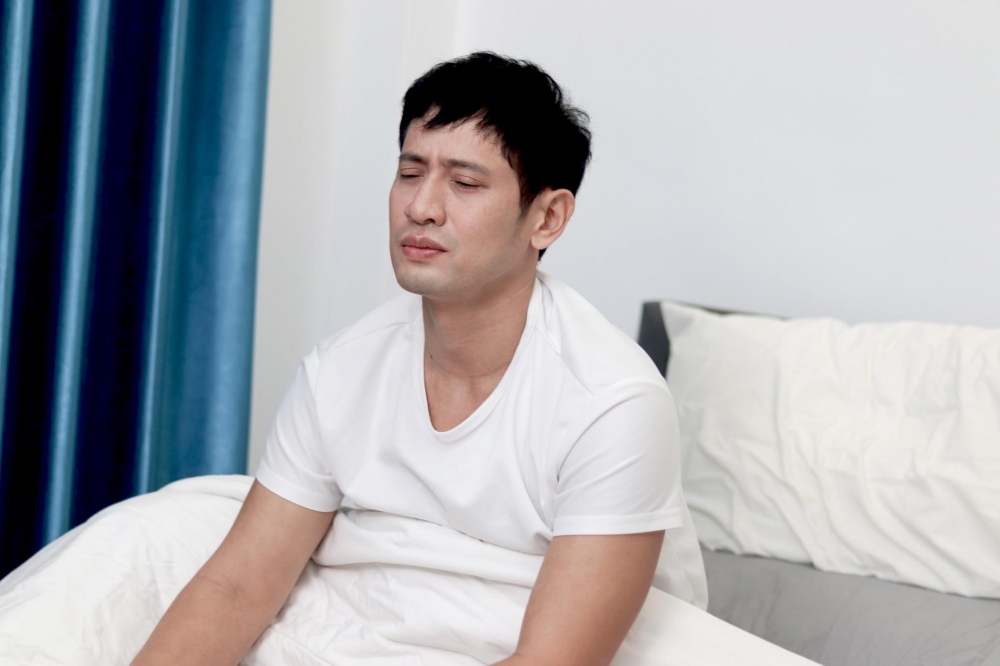Is Male Menopause Real? Understanding Hormonal Changes in Ageing Men
.jpg)
As men grow older, it’s not uncommon to feel changes in energy, mood, sleep, or even sexual drive. Some may ask, “Am I going through male menopause?” You may be wondering whether men go through ageing-related hormonal changes as women do, and if so, how these changes affect their health, emotions, and everyday life.
While menopause is a well-understood and expected milestone for women, the idea that men experience something similar is still debated. However, there is a real condition that affects many aging men, known as andropause or late-onset hypogonadism. This condition involves a gradual decline in testosterone, the primary male hormone, which can influence both physical health and emotional well-being.
Let’s take a closer look at what this really means, with expert insight from Dr Lim Kim Piow, Consultant Endocrinologist and Internal Medicine Specialist at Sunway Medical Centre Velocity.

What Is “Male Menopause” and Is It the Right Term?
Unlike women, who go through a distinct transition known as menopause, marked by a rapid drop in reproductive hormones and the end of fertility, men do not go through a universal, clearly defined change. Instead, men experience a gradual decline in testosterone that begins around the age of 40 and continues over time. This slow hormonal shift doesn’t affect every man the same way. Some may have no symptoms at all, while others may feel significant changes in their physical and emotional health.
This condition has been referred to as male menopause, andropause, or even male climacteric, but it’s important to understand that it’s not exactly equivalent to female menopause. While the term is convenient, it can be misleading. That said, the symptoms and changes are very real for many men.
What Are the Signs of Andropause?
As testosterone levels slowly decrease, some men begin to experience a range of symptoms that may affect their quality of life. These can include a decrease in sexual desire, difficulty maintaining erections, or reduced satisfaction during sex. Alongside these, men may notice increased belly fat, reduced muscle strength, and even changes in bone density.
Emotionally, the shift can be just as challenging. Some men report feeling unusually tired, irritable, or even depressed, with a noticeable dip in motivation. Others may struggle with concentration, experience hot flush-like sensations, or have disrupted sleep patterns. These symptoms may creep in subtly, and can often be confused with general ageing or stress. That’s why it’s crucial to monitor how you’re feeling and seek advice if things feel “off.”
Why It’s Not the Same as Female Menopause
It’s important to distinguish that while women experience a sudden and complete cessation of hormone production during menopause, in men, testosterone declines at a much slower pace after age 40. This means many men may not notice symptoms until much later, or may never experience any at all.
Unlike women who lose the ability to conceive after menopause, men continue to produce sperm and remain fertile well into their older years. The testes still generate testosterone, especially within the reproductive system, even when blood levels may seem lower.
Furthermore, menopause is universal, all women will go through it, usually between ages 45 and 55. But for men, only some will experience testosterone levels low enough to require treatment. This reinforces the medical community’s position that male menopause is not a direct parallel to the female experience.
What Causes Testosterone to Decline?
Ageing is the main reason testosterone levels drop, but several lifestyle and health factors can worsen the decline. Conditions such as obesity, type 2 diabetes, chronic illnesses, and sleep disorders like obstructive sleep apnoea can accelerate hormonal changes. In addition, stress, depression, poor diet, or lack of exercise can play a major role in how testosterone is regulated in the body.
In some cases, the cause may be medical, such as testicular disorders, pituitary gland dysfunction, or side effects from certain medications like corticosteroids or opioids. If you’re unsure, it’s always best to get it checked professionally.
When Should You Seek Medical Advice?
If you’ve been feeling persistently low in energy, struggling with mood swings, or noticing changes in your sexual performance, it may be more than just getting older. Symptoms like low libido, erectile dysfunction, fatigue, weight gain, depression, or memory lapses can all point towards a hormonal imbalance especially if they occur together.
The first step is often a simple blood test to measure testosterone levels, usually taken in the morning when levels are at their peak. From there, your doctor may suggest additional investigations to rule out other causes, such as thyroid issues, metabolic conditions, or psychological factors.
If you’re unsure where to begin, start by booking a Men’s Health Screening Package to assess your overall health and hormone profile.
How Is Low Testosterone Treated?
Not every man with low testosterone needs treatment. Often, the first line of action is improving lifestyle habits — which can naturally help rebalance hormone levels. This includes:
- Adopting a healthier diet
- Losing excess body weight
- Engaging in regular strength-based and aerobic exercise
- Managing stress and sleep
- Limiting alcohol and smoking
- Managing comorbidities such as type 2 diabetes, high blood pressure, high cholesterol, and sleep apnoea, which can all worsen hormonal imbalance
If symptoms persist and testosterone is confirmed to be low, your doctor may consider Testosterone Replacement Therapy (TRT). This can be administered through gels, injections, or patches and requires ongoing monitoring of blood parameters, including full blood count, lipid profile, liver function, and prostate markers, as well as cardiovascular health assessments. While TRT can significantly improve symptoms of hypogonadism such as fatigue, low libido, and mood changes, it is not suitable for everyone. There are certain contraindications, and TRT may not be recommended in men with specific prostate or cardiovascular conditions.
To determine if TRT is right for you, please consult a specialist. At Sunway Medical Centre Velocity, our team of urologists and endocrinologists work together to provide comprehensive evaluation and safe, personalised treatment plans.
If you’re experiencing symptoms or need further advice, schedule a consultation with our Consultant Endocrinologist at Sunway Medical Centre Velocity.
The Bottom Line
So, is male menopause real? Not in the same way it is for women, but the hormonal changes many men experience as they age are very real, and they deserve attention. If you’ve been feeling off, less energised, or not quite yourself, don’t ignore it. The earlier you understand what’s happening in your body, the sooner you can make empowered choices for your health.
Whether it’s through health screening, hormone testing, or personalised care, you don’t have to navigate this journey alone. Our team at Sunway Medical Centre Velocity is here to help you feel your best at every stage of life.
Check your Men’s Health Screening Package here
Book a consultation with our specialists
Was this article helpful?
2 out of 2 found this helpful
Suggest to Read









